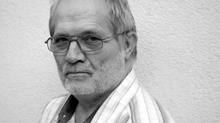Der goldene Drache
| Der goldene Drache | |
|---|---|
| Opera by Péter Eötvös | |
 The composer in 2011 | |
| Librettist | Roland Schimmelpfennig |
| Language | German |
| Based on | Schimmelpfennig's play of the same name |
| Premiere | 29 June 2014 |
Der goldene Drache (The Golden Dragon) is an opera by Hungarian composer Péter Eötvös to a libretto by Roland Schimmelpfennig, based on his play of the same name. It premiered on 29 June 2014 at the Bockenheimer Depot in Frankfurt, conducted by the composer.
History
[edit]Eötvös composed the opera in 2013/14 on a commission by ensemble modern and the Oper Frankfurt, his ninth opera.[1] He had written operas on literary plots before, beginning with his first in 1998, Tri sestry (Three Sisters) after Anton Chekhov's play.[2] The German libretto by Schimmelpfennig is based on his play of the same name. The play had premiered five years earlier at the Akademietheater in Vienna, staged by the author,[2] and was awarded the Mülheimer Dramatikerpreis of 2010. Schimmelpfenig and Eötvös chose 21 short scenes from the play's 48[3] "disparate snapshots".[4] The opera premiered on 29 June 2014 in Frankfurt's Bockenheimer Depot, conducted by the composer.[5] It was staged by Elisabeth Stöppler, with stage design by Hermann Feuchter and costumes by Nicole Pleuler. The composer revised the opera in 2015.[4] The Frankfurt production was then shown at the Bregenz Festival in August 2015.[1] The UK premiere was toured by Music Theatre Wales in 2017, during which time it was banned from the stage of the Hackney Empire for alleged "yellowface" racism.[6]
Roles
[edit]The five singers required for a performance all perform several of the 18 roles, switching gender, age and culture.[2][4][5] Their voices are amplified.[4][5] The duration is given as 1 1/2 hours.[3]
| Roles | Voice type | Premiere cast, 29 June 2014 Conductor: Péter Eötvös[4] |
|---|---|---|
| Young woman / The little Chinese | soprano | Kateryna Kasper |
| Woman over 60 / Old cook / granddaughter / Ant / Hans / Chinese mother | mezzo-soprano | Hedwig Fassbender |
| Young man / young Asian / waitress / grandfather / Cricket / Chinese aunt | tenor | Simon Bode |
| Man over 60 / old Asian / Eve (dark-brown stewardess) / granddaughter's friend / Chinese father | tenor | Hans-Jürgen Lazar |
| Man / Asian / Inga (the blonde stewardess) / Chinese uncle | baritone | Holger Falk |
Plot and music
[edit]The story begins in a Chinese restaurant, where a cook, the Little Chinese, suffers from toothache. As an illegal immigrant, he avoids seeing a dentist.[3] When the tooth is extracted unprofessionally in the kitchen, he bleeds to death. A stewardess finds the tooth in her bowl of soup and takes it on a trip to China.[3]
The story is both tragic and comic, absurd, grotesque and enigmatic. The music adds even more dimensions, revealing connections and psychological aspects.[3] It uses parlando style for many scenes, but reserves a final monologue of farewell to the Little Chinese.[3]
Instrumentation
[edit]The instrumentation calls for:
- woodwinds: flute (also alto flute and piccolo), oboe (also Cor anglais), clarinet, bass clarinet, bassoon (also contrabassoon)
- brass: horn, 2 trumpets, trombone
- percussion: many, and kitchen sounds
- keyboard (digital hammond and piano)
- strings (1 · 0 · 1 · 1 · 1, or 6 · 0 · 4 · 3 · 1)[4]
References
[edit]- ^ a b "Der goldene Drache / Musiktheater (2014) von Peter Eötvös" (in German). Bregenz Festival. 2015. Retrieved 14 June 2018.
- ^ a b c Lange, Joachim (30 June 2014). "Wenn der Zahn aber nun ein Loch hat" (in German). Die Deutsche Bühne. Retrieved 14 June 2018.
- ^ a b c d e f Decker-Bönniger, Ursula (4 July 2014). "Das politische Musiktheater lebt! / Der goldene Drache (UA)" (in German). Online Musik Magazin. Retrieved 14 June 2018.
- ^ a b c d e f "Der goldene Drache". Schott. Retrieved 14 June 2018.
- ^ a b c Jungheinrich, Hans-Klaus (30 June 2014). "Peter Eötvös: Der goldene Drache in Frankfurt / Aus der Bistroküche nach Utopia" (in German). Frankfurter Rundschau. Retrieved 14 June 2018.
- ^ "Hackney Empire pulls out of Chinese takeaway opera over all-white cast". the Guardian. 12 October 2017.
